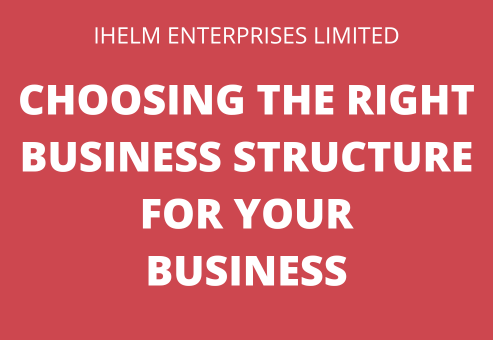During September’s Facebook Live, I talked about the different types of business structures there are in the UK.
When starting a business in the United Kingdom, one of the most crucial decisions you’ll make is selecting the appropriate business structure. Your choice can have far-reaching implications on your business’s legal responsibilities, tax obligations, and overall flexibility. I will walk you through the key factors to consider when choosing the right business structure for your venture in the UK.
1. Sole Trader
Being a sole trader is the simplest way to start a business in the UK. As a sole trader, you are the sole owner of your business, and there’s minimal paperwork involved. This structure is suitable for small businesses and freelancers.
Pros:
– Full control of your business.
– Simple registration and low administrative burden.
– All profits belong to you.
Cons:
– Unlimited personal liability for business debts.
– Limited access to funding compared to other structures.
– Potential higher tax rates as your income increases.
2. Partnership
Partnerships involve two or more people sharing the ownership and responsibilities of a business. There are two primary types: general partnerships and limited partnerships.
Pros:
– Shared responsibilities and expertise.
– Lower administrative burden compared to limited companies.
– Flexible profit-sharing arrangements.
Cons:
– Unlimited personal liability in general partnerships.
– Potential for conflicts between partners.
– Shared decision-making, which can lead to disagreements.
3. Limited Company
A limited company is a separate legal entity from its owners (shareholders). This structure offers liability protection and is often chosen by larger businesses.
Pros:
– Limited personal liability; your personal assets are separate from your business.
– Tax advantages, including lower corporate tax rates.
– Enhanced credibility for your business.
Cons:
– Complex administrative requirements, including annual filings.
– Less privacy; financial information is publicly available.
– Stricter regulations and reporting standards.
4. Limited Liability Partnership (LLP)
An LLP combines elements of both partnerships and limited companies. It provides liability protection for its members (partners) while allowing them to participate in the management of the business.
Pros:
– Limited personal liability for partners.
– Flexibility in management structure.
– Easier to attract investors.
Cons:
– More complex to set up and maintain than a general partnership.
– Stricter reporting and filing requirements.
– Not suitable for every type of business.
5. Community Interest Company (CIC)
CICs are a unique option for businesses with a social or community-focused mission. They have a primary goal of benefiting the community rather than private shareholders.
Pros:
– Legal requirement to reinvest profits in community initiatives.
– Eligible for certain grants and funding.
– Built-in social mission for a sense of purpose.
Cons:
– Limited distribution of profits to stakeholders.
– Increased regulatory oversight.
– Restrictions on asset transfers.
Choosing the right business structure is a critical step in establishing your business in the UK. Each option comes with its own set of advantages and disadvantages, so it’s essential to carefully consider your business’s goals, size, and industry before making a decision. Consulting with a legal or financial advisor can also provide valuable insights tailored to your specific situation. Ultimately, selecting the right structure will lay a strong foundation for the success and growth of your business.
If you have any questions about the different types of business structures there are in the UK, please feel free to e-mail me.

